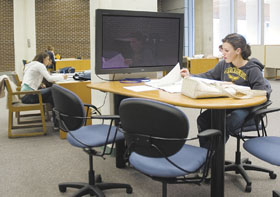  |
| HOME | THIS ISSUE | CALENDAR | GRANTS | BACK ISSUES | < BACK | NEXT > |
Resource center opens to help students with computer technologyby Sherry Fisher& Anand Prakash - November 7, 2005 |
||||
|
Students who need help preparing PowerPoint presentations, developing video clips, creating e-portfolios, or handling other projects involving computer technology can contact the new Learning Resource Center. Located on Level I of the Babbidge Library, the center is the first centralized source of help with computer technology for students. The center is supported by the Office for Undergraduate Education and Instruction, the Institute for Teaching and Learning, and the University Libraries. Students may come to the center for in-person assistance, receive telephone support or online help through e-mail, or consult the Learning Resource Center web pages. Steven Park is director of the center, which is staffed by Student Educational Technology Assistants. The assistants have backgrounds in computer technology and also work at the Instructional Resource Center – located in the Center for Undergraduate Education – helping faculty. The Learning Resource Center (LRC) operates its own information and service desk, and has work stations and a lounge area with comfortable furniture. “It’s a highly trafficked, student-friendly space,” says Park. The center has five PCs, two MACs, and two large plasma screens. The plasma screens are available for students working on group projects. Kim Chambers, director of instructional resources, says the new center will help students fulfill the computer technology competency component of the general education requirements for undergraduates. There are eight areas of competency within the computer technology component. Students can sign up for classes that deal with each of these areas. The classes will be taught by Park, Chambers, and other LRC colleagues.
Chambers says faculty have often asked him where their students can call for technology assistance. He adds that, through his work with the Instructional Resource Center helping faculty use technology to promote effective teaching and learning, he was aware of the need for a similar facility geared toward students. “The new center is one more way the University is helping teach college students the technology they will need to know that will benefit them in their careers,” Chambers says. Park, who was an advisor in the School of Business for eight years, says his new job is a good fit. “I see myself as an educator,” he says. He has a master’s degree in education, and will defend his Ph.D. in history this month. “I have always been on the cutting edge of the academic information technologies that we have on campus, even though IT isn’t my academic field,” he says. “This position was appealing to me because they were looking for someone who not only had IT experience, but who was primarily an educator.” Adds Park: “Students come to college knowing a lot about instant messaging and text messaging, but they don’t know about the information technologies they’ll be expected to use in an academic setting. The Learning Resource Center is just what the University needed.” |
| ADVANCE HOME UCONN HOME |

